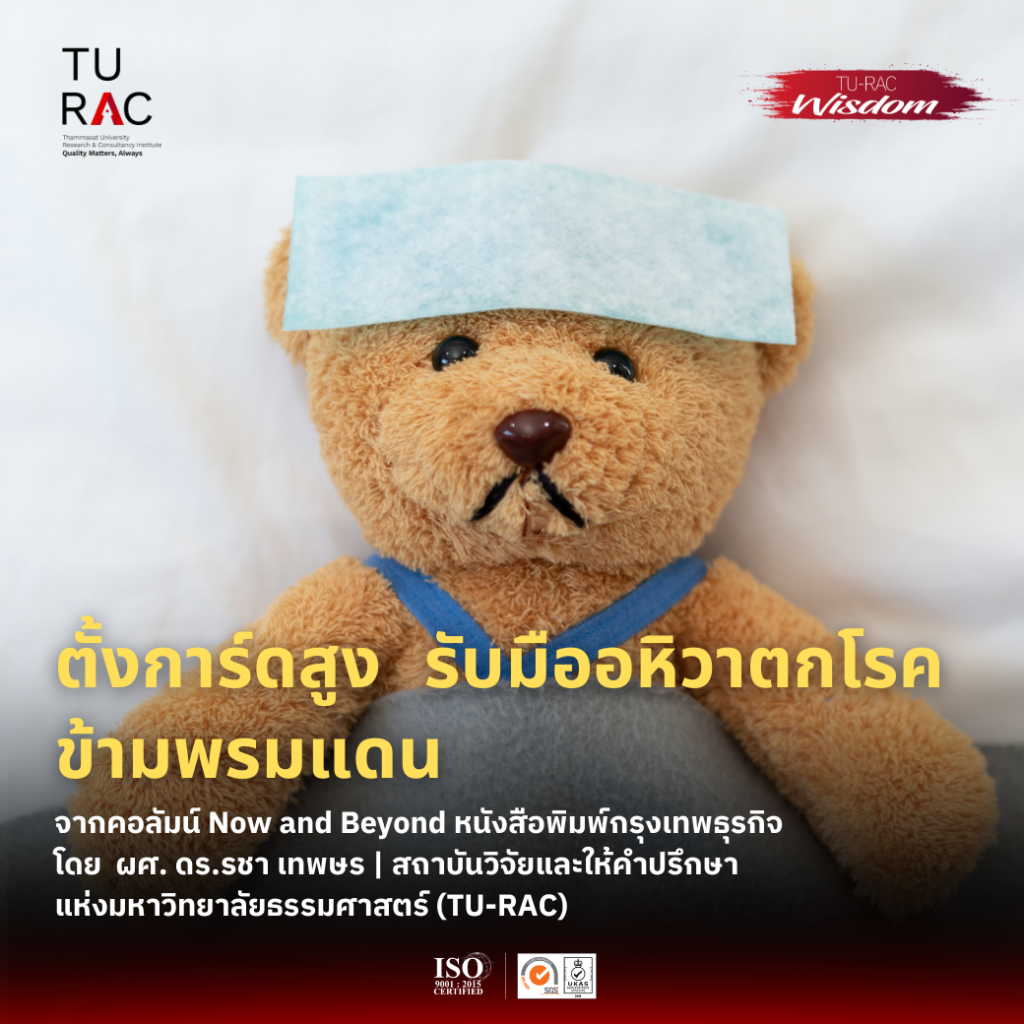TU-RAC ชวนอ่านบทความ เรื่อง ตั้งการ์ดสูง รับมืออหิวาตกโรคข้ามพรมแดน | โดย ผศ. ดร.รชา เทพษร สถาบันวิจัยและให้คำปรึกษาแห่งมหาวิทยาลัยธรรมศาสตร์ (TU-RAC) ในคอลัมน์ Now and Beyond by TU-RAC ทุกวันพฤหัสบดี ในหนังสือพิมพ์กรุงเทพธุรกิจ
.
ไม่นานมานี้ ประเทศเมียนมาได้ประกาศการระบาดของอหิวาตกโรค (Cholera) ในเมืองย่างกุ้ง ส่งผลให้มีผู้เสียชีวิตอย่างต่อเนื่อง โดยเฉพาะในกลุ่มเด็กเล็กและผู้สูงอายุ อหิวาตกโรคเป็นโรคติดต่อร้ายแรงที่เกิดจากแบคทีเรีย Vibrio cholerae ซึ่งปนเปื้อนในน้ำและอาหารที่ไม่สะอาด ลักษณะเด่นของโรคคืออาการถ่ายอุจจาระเหลวแบบเฉียบพลัน ลักษณะคล้ายน้ำซาวข้าว ในกรณีที่รุนแรงการสูญเสียน้ำจากอาการท้องเสียอาจมีมากถึง 16 ลิตรต่อวัน บางรายอาจมีอาการอาเจียนร่วมด้วย อาการมีตั้งแต่เล็กน้อยจนถึงรุนแรง โรคนี้แพร่กระจายผ่านการปนเปื้อน ของน้ำและอาหาร เช่น น้ำดื่มที่ไม่สะอาด อาหารทะเล หรือน้ำแข็งที่ผลิตจากน้ำปนเปื้อน นอกจากนี้ยังพบการปนเปื้อนในแหล่งน้ำ ระบบชลประทาน และระบบประปา ซึ่งเพิ่มความเสี่ยงในพื้นที่ที่ขาดแคลนสุขอนามัย
การป้องกันการแพร่ระบาดของอหิวาตกโรคสามารถทำได้โดยการรักษาความสะอาดและสุขอนามัยในชีวิตประจำวัน ควรปฏิบัติตามหลัก “กินร้อน ช้อนกลาง ล้างมือ” ดื่มน้ำสะอาดหรือผ่านการต้มสุก และหลีกเลี่ยงการบริโภคอาหารหรือเครื่องดื่มที่อาจปนเปื้อนเชื้อโรค นอกจากนี้ การเพิ่มระดับคลอรีนในน้ำประปาให้อยู่ในเกณฑ์ที่ปลอดภัย และการเฝ้าระวังอาการท้องเสียในพื้นที่เสี่ยงเป็นสิ่งสำคัญที่ช่วยควบคุมการระบาด
ในสถานการณ์ปัจจุบัน การร่วมมือกันเฝ้าระวังและป้องกันการแพร่ระบาดของอหิวาตกโรคไม่เพียงแต่ช่วยลดความเสี่ยงในประเทศ แต่ยังช่วยป้องกันการระบาดที่อาจลุกลามจนกลายเป็นภัยคุกคามระดับโลกอีกครั้ง เราทุกคนจึงควรใส่ใจสุขอนามัยและปรับตัวเพื่อรับมือกับโรคนี้อย่างมีประสิทธิภาพ เพื่อให้ผ่านพ้นวิกฤตครั้งนี้ไปด้วยกันอย่างปลอดภัย
_______________________________________________________
Raise Your Guard with “Eat Hot, Use Shared Utensils, Wash Hands” to Combat Cholera
.
TU-RAC invites you to read the article “Raise Your Guard: Combating Cross-Border Cholera” by Assistant Professor Dr. Racha Tepsorn, Thammasat University Research and Consultancy Institute (TU-RAC), featured in the Now and Beyond by TU-RAC column every Thursday in the Bangkok Biz News newspaper.
.
Myanmar recently announced a cholera outbreak in Yangon, which has resulted in continuous fatalities, particularly among young children and the elderly. Cholera is a severe infectious disease caused by the Vibrio cholerae bacteria, often found in contaminated water and food. The disease is characterized by acute watery diarrhea, often resembling rice water. In severe cases, fluid loss from diarrhea can reach up to 16 liters per day, and some patients may experience vomiting as well. Symptoms can range from mild to severe.
The disease spreads through contaminated water and food, including unsafe drinking water, seafood, or ice made from contaminated water. Contamination can also occur in natural water sources, irrigation systems, and public water supplies, significantly increasing risks in areas with poor hygiene and sanitation.
Preventing the spread of cholera requires maintaining cleanliness and hygiene in daily life. It is essential to follow practices such as “eating freshly cooked food, using separate utensils, and washing hands frequently.” Drinking clean or boiled water and avoiding food or beverages that may be contaminated are crucial. Additionally, maintaining safe chlorine levels in public water supplies and monitoring diarrhea cases in high-risk areas are critical measures to control outbreaks.
In the current situation, collaborative efforts to monitor and prevent cholera outbreaks not only help reduce the risk within the country but also prevent the potential for widespread global threats. It is vital for everyone to prioritize hygiene and adapt their behaviors to effectively combat this disease, ensuring we overcome this crisis together safely.



